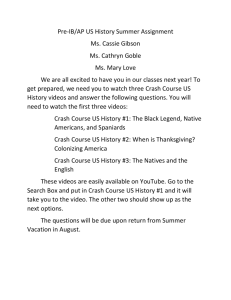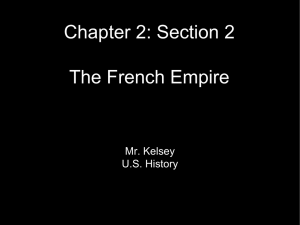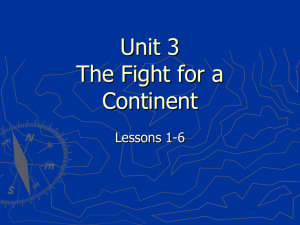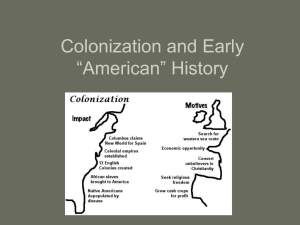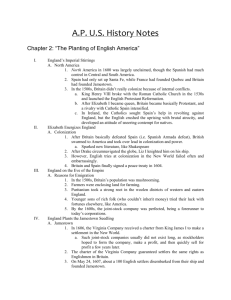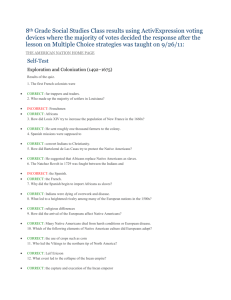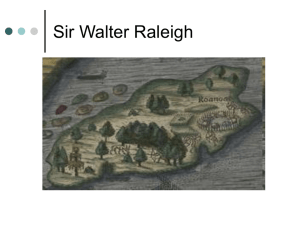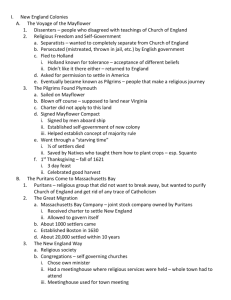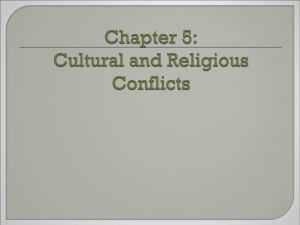Summer Homework
advertisement
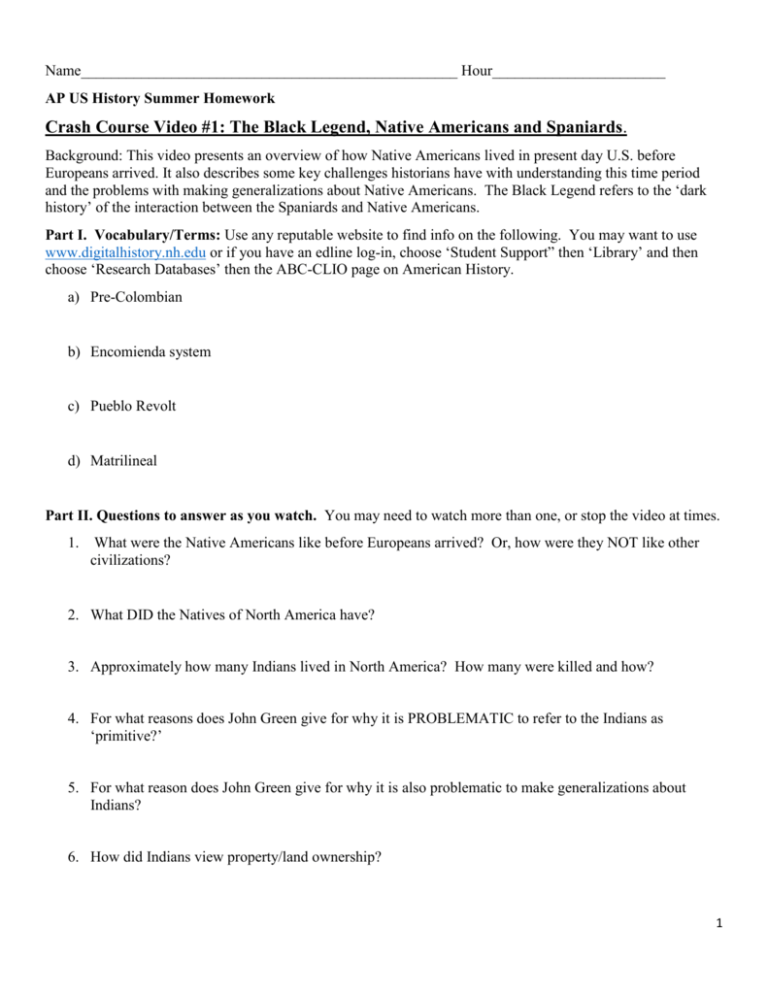
Name__________________________________________________ Hour_______________________ AP US History Summer Homework Crash Course Video #1: The Black Legend, Native Americans and Spaniards. Background: This video presents an overview of how Native Americans lived in present day U.S. before Europeans arrived. It also describes some key challenges historians have with understanding this time period and the problems with making generalizations about Native Americans. The Black Legend refers to the ‘dark history’ of the interaction between the Spaniards and Native Americans. Part I. Vocabulary/Terms: Use any reputable website to find info on the following. You may want to use www.digitalhistory.nh.edu or if you have an edline log-in, choose ‘Student Support” then ‘Library’ and then choose ‘Research Databases’ then the ABC-CLIO page on American History. a) Pre-Colombian b) Encomienda system c) Pueblo Revolt d) Matrilineal Part II. Questions to answer as you watch. You may need to watch more than one, or stop the video at times. 1. What were the Native Americans like before Europeans arrived? Or, how were they NOT like other civilizations? 2. What DID the Natives of North America have? 3. Approximately how many Indians lived in North America? How many were killed and how? 4. For what reasons does John Green give for why it is PROBLEMATIC to refer to the Indians as ‘primitive?’ 5. For what reason does John Green give for why it is also problematic to make generalizations about Indians? 6. How did Indians view property/land ownership? 1 7. Give 2 reasons why the Spaniards came to America? 8. What is the SIGNIFICANCE (not what was it, but what did it lead to/importance) of the Pueblo Revolt? 9. Why is it difficult to truly know the Spaniards treated Indians and if the Black Legend is completely true? Part III. Mystery Document/Primary Source A History of the Indies by Bartolome De Las Casas, 1528 The Indians [of Hispaniola] were totally deprived of their freedom and were put in the harshest, fiercest, most horrible servitude and captivity which no one who has not seen it can understand. Even beasts enjoy more freedom when they are allowed to graze in the fields. But our Spaniards gave no such opportunity to Indians and truly considered them perpetual slaves, since the Indians had not the free will to dispose of their persons but instead were disposed of according to Spanish greed and cruelty, not as men in captivity but as beasts tied to a rope to prevent free movement. When they were allowed to go home, they often found it deserted and had no other recourse than to go out into the woods to find food and to die. When they fell ill, which was very frequently because they are a delicate people unaccustomed to such work, the Spaniards did not believe them and pitilessly called them lazy dogs and kicked and beat them; and when illness was apparent they sent them home as useless. . . . They would go then, falling into the first stream and dying there in desperation; others would hold on longer but very few ever made it home. I sometimes came upon dead bodies on my way, and upon others who were gasping and moaning in their death agony, repeating “Hungry, hungry.” And this was the freedom, the good treatment and the Christianity the Indians received. 10. In what way(s) does this writing support the story of the Black Legend? 11. Why did those that survived find their homes deserted? 12. By the mid-1500s, the Spanish Crown passed laws that required Spaniards to treat Indians better and to gradually end the encomienda system and slavery. To what extent do you believe Casas is responsible for this? Should he be considered a hero? 2 Crash Course Video #2: When is Thanksgiving? Colonizing America Background: This video describes why and how the first ENGLISH settlers came to America. It first discusses the economic motivations for those settlers who arrived in Virginia in the very early 1600s; then it looks at the Pilgrims and Puritans who settled in Massachusetts beginning around 1620 for both economic and religious reasons. It looks at the deathly struggles they faced in the New World, their early successful relations with the Native Americans, their hopes for a new society and how they adapted to their conditions. 1. Why did those who arrived in Virginia from England come to America? 2. Those who established the colony of Jamestown, Virginia hoped to find ________________, which did not exist. 3. Explain, in general, what happened to the settlers of Jamestown by 1610. 4. How did the headright system encourage more people to leave England and come to America. 5. Explain how indentured servants were different from slaves. 6. What “drug” saved the economy of Virginia? _________________ 7. Together, Virginia and Maryland were known as the “Chesapeake colonies” (because they are both located along Chesapeake Bay. Maryland was founded in what year? __________ It was a settlement for which religious group? ______________________ 8. Which religious group founded Massachusetts? ________________________ 9. Most of those who settled in New England (which is where Massachusetts is located) were Protestant Christians. What did they believe about the Protestant Church of England? 10. In 1620 the Pilgrims founded what colony? ______________________ (located in Massachusetts) 11. What was the Mayflower Compact? 12. Who helped all the Pilgrims from dying, shortly after their arrival in Plymouth? ___________________ 3 13. Mystery Document: Listen carefully as the narrator (John Green) reads the mystery document (entitled A Model of Christian Charity by Jonathan Winthrop, relisten a couple times if necessary): Explain in your own words how the idea expressed in this document express who the Puritans were, and what their motivations and plans were for coming to America. 14. Explain how the concept of “a city upon a hill” teaches us about why the Puritans came to America. 15. Were the Puritans “big on equality”? Explain, giving examples. 16. According to historian Eric Foner’s research on the Puritans, they believed INequality was an expression of who’s will? ____________ 17. Despite their willingness to accept inequality, Puritans did desire for EVERYONE to be able to read what important book? _________________________ 18. Explain why both Roger Williams and Anne Hutchinson were banished from (kicked out of) Massachusetts, and explain what these banishments tell us about Puritan society. 19. Summarize, in 2-3 sentences, what you have learned about the early settlers of Virginia and Massachusetts. 4 Crash Course Video #3: The Natives and the English. Background: The following video gives an introduction to the impact of the relationship between the Native Americans and the British. It demonstrates how that interaction was first for mutual gain and then transforms to one where one side was trying to take advantage of the other. Part I. Questions to answer as you watch. You may need to watch more than one, or stop the video at times. 1. What were the two things that Chief Powhattan realized about the English? 2. How did the relationship between the Indians and English start off? Why? 3. In what ways did the beginning of trade between the English and Indians disturb the balance of Native American life (list at least 4)? 4. What actions by the English upset this balance for the Natives? 5. What is the story of Pocahontas that you are familiar with? What actually happened with Pocahontas? 6. Of the original 6000 settlers of the Virginia colony, how many were left when it finally became a royal colony? 7. Why would any settler want to be more like the Native Americans at the time? 8. What caused the Pequot War? Why is that not the correct way of referring to it? 9. What was the purpose of King Phillip’s War that was derived from the mystery document? 5 Part II. Supplementary document. Read the following document and answer the questions But What Warrant Have We to Take That Land? John Winthrop 1629 Obj. 5. But what warrant have we to take that land, which is and hath been of long time possessed of others the sons of Adam? Ans. That which is common to all is proper to none. This savage people ruleth over many lands without title or property; for they enclose no ground, neither have they cattle to maintain it, but remove their dwellings as they have occasion, or as they can prevail against their neighbors. And why may not Christians have liberty to go and dwell amongst them in their wastelands and woods (leaving them such places as they have manured for their corn) as lawfully as Abraham did among the Sodomites? For God hath given to the sons of men a twofold right to the earth; there is a natural right and a civil right. The first right was natural when men held the earth in common, every man sowing and feeding where he pleased: Then, as men and cattle increased, they appropriated some parcels of ground by enclosing and peculiar manurance, and this in time got them a civil right. Such was the right which Ephron the Hittite had to the field of Machpelah, wherein Abraham could not bury a dead corpse without leave, though for the out parts of the country which lay common, he [Abraham] dwelt upon them and took the fruit of them at his pleasure. This appears also in Jacob and his sons, who fed their flocks as boldly in the Canaanites' land, for he [Jacob] is said to be lord of the country; and at Dotham and all other places [where] men accounted nothing their own, but that which they had appropriated by their own industry, as appears plainly by Abimelech's servants, who in their own country did often contend with Isaac's servants about wells which they had dug; but never about the lands which they occupied. So likewise between Jacob and Laban; he would not take a kid of Laban's without special contract; but he makes no bargain with him for the land where he fed. And it is probable that if the country had not been as free for Jacob as for Laban, that covetous wretch would have made his advantage of him, and have upbraided Jacob with it as he did with the rest. 2dly, There is more than enough for them and us. 3dly, God hath consumed the natives with a miraculous plague, whereby the greater part of the country is left void of inhabitants. 4thly, We shall come in with good leave of the natives. Questions 10. By what right does Winthrop believe the English settlers are entitled to the Indians’ lands? What authority does Winthrop invoke? 11. What attitudes towards the Native Americans does Winthrop exhibit? Do you think that these attitudes were typical of all English settlers? Explain. 12. Winthrop (a lawyer) argues that there are two different rights to the use of land: a “natural” right and a “civil” right. What does he mean by this, and how does it affect his response to the question in the title of this document? 6 Crash Course Video #4: The Quakers, the Dutch, and the Ladies. Background: This video presents an overview of the colonies, outside of Massachusetts and Virginia. He describes the structure of colonial society including Bacon’s Rebellion and the idea of a classless society. He also analyzes how ‘everyday events’ laid the seeds of the idea of an American Revolution 50 years later. Part I. Vocabulary/Terms: Use any reputable website to find info on the following. You may want to use www.digitalhistory.nh.edu or if you have an edline log-in, choose ‘Student Support” then ‘Library’ and then choose ‘Research Databases’ then the ABC-CLIO page on American History. e) Religious Toleration f) Quakers g) Abolitionists h) Pacifist i) Indentured Servants j) Socio-Economic status / class Part II. Questions to answer as you watch. You may need to watch more than one, or stop the video at times. 1. Who were the original founders of New York, and why was it founded? 2. English rule over the colony of New York meant less freedoms for which two groups of people? 3. What were some of the factors that attracted settlers to Pennsylvania? 4. What was the preferred system of labor in the colony of South Carolina? 5. What 2 effects of Bacon’s Rebellion? a. b. 6. In what ways was the Dominion of England a response to Bacon’s Rebellion? 7 7. What event in England was credited with ending the Dominion of England? 8. How did the English Toleration Act of 1690 end the ‘Puritan Experiment”? 9. List the 3 labor/economic classes of colonial America? 10. Which region of the colonies had an elite ruling class that tried to perpetuate itself? 11. In what ways did colonial women experience greater economic freedom? And in what ways did colonial women experience greater economic constraints? 12. John Green says that the colonial era provides us with an example of history that is much more than history of ‘great men’. History is about ___________________________. Part III. Mystery Document/Primary Source Bacon’s Rebellion: The Declaration (1676) by Nathaniel Bacon Of this and the aforesaid articles we accuse Sir William Berkeley as guilty of each and every one of the same, and as one who has traitorously attempted, violated, and injured his Majesty’s interest here by a loss of a great part of this his colony and many of his faithful loyal subjects by him betrayed and in a barbarous and shameful manner exposed to the incursions and murder of the heathen. And we do further declare these the ensuing persons in this list to have been his wicked and pernicious councilors, confederates, aiders, and assisters against the commonalty in these our civil commotions. 13. Who were the ‘heathens’ in which colonists needed protection from? 14. What adjectives are used to describe men favored by Berkley? 15. Bacon’s Rebellion is, at times, viewed as a precursor to the American Revolution and the colonists’ rise up against the British Crown. Discuss the validity of this statement. 8 Crash Course Video #5: The 7 Years War (French and Indian War 1750-1763) Background: This video presents an overview of the power struggle between Great Britain and France known as the 7 Years War in Europe and how it spread to North America as the French and Indian War. At first the French and their Indian allies were winning, but Great Britain rallied in 1759 and was victorious. The war ended with the Treaty of Paris 1763 where France lost all of its land in Canada to the British. The ramifications of the war were important not only for the British, but also for Native Americans and the American colonists as well in would lead to the beginnings of the American Revolution. 1. Who called the 7 Years War (French and Indian War) the first “world war?” 2. What were some of the root causes of the French and Indian War? 3. In detail, explain mercantilism. 4. Why were colonies so economically beneficial to the British? 5. What were the two crops that caused a huge demand for slaves in the Southern Colonies? 6. In what areas of the world were the British and French in conflict? 9 7. Why were the Spanish not a threat to Great Britain the way France was? 8. How many Spanish settlers were there in Los Angles in 1750? 9. How many French colonists were there in North American in 1750? 10. In what land area were the French and British coming in to conflict over in 1754? 11. Who was siding with the French over the British in the 1750’s? 12. Name the two battles were the British were beaten by the French and Indians in 1754 and who was one of the young American colonels in the battles? 13. What happened to the French settlers who were expelled from Nova Scotia, Canada in the 1750’s? Where did some of them eventually settle? 10 14. What three forts and one city were captured by the British in 1759, turning the tide of the war? 15. How did the map of North America change drastically after the Treaty of Paris was signed in 1763? 16. Economically, how might the British have actually lost from winning the French and Indian War? 17. Who wrote the mystery document? 18. In detail, explain Pontiac’s Rebellion and how the British chose to deal with it? 19. What was the Proclamation of 1763 and how the colonists reacted to it? 20. What was a republican form of government as defined by the colonists? 11 21. According to liberalism, what is the task of government? 22. According to 17th Century English philosopher John Locke, what are the natural rights of man? 23. In detail, explain the Great Awakening? 24. How did the Great Awakening impact colonial thought? 25. If you add economic, political, and religious changes of the era, how did they negatively impact the relationship between the British and their American colonists? 12
